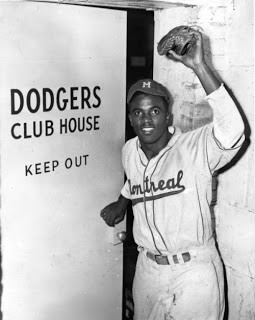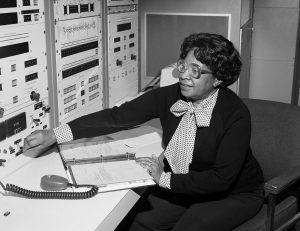"I think I can play in the big leagues. All I am asking for is the opportunity. If I fail, I'll step aside and try to so something else." - Jackie Robinson1Jackie Robinson, a man of courage, determination, and record-breaking events, was born on January 31, 1919, to a single mother who raised him along with four other siblings. This little boy grew up to change the views and opinions of African-Americans playing baseball in the Major Leagues. Jackie Robinson became the figure that would embody African-Americans competing in “a white-man’s game” and broke through that barrier of racism. Through the years growing up, Jackie competed against his older brother, Matthew Robinson, in whatever game they were playing. His older brother competed in the 1936 Berlin Olympics in the 200-meter dash, winning a silver medal just behind Jesse Owens. Matthew was the person who inspired Jackie to pursue his talents and to dream big. That is exactly what younger brother Jackie Robinson did, despite the racial controversy that lay ahead.

Jackie Robinson attended UCLA and became the first student athlete to win varsity letters in all four sports: baseball, basketball, football, and track. Unfortunately, in early 1941, just shy of graduation, Robinson left college “convinced that a college degree would not help a black man get a job during the Great Depression.”2 In the fall of 1941, Jackie moved to Honolulu, Hawaii to play football for a Semi-Professional team called the Honolulu Bears. Sadly, Robinson’s season was cut short due to his enlistment into the Army for World War II. He served in the Army from 1942 to 1944, ranking as high as 2nd Lieutenant. After being honorably discharged from the Army, Jackie Robinson’s life changed the world forever through the sport that he least excelled in, baseball.

The baseball world dealt with its own segregation views. “Segregated baseball showed the great injustice of Jim Crow, yet the Negro Leagues (the generic name for the organized black major leagues from 1920 through the 1940’s) also provided opportunities for black players, executives, and towns to thrive in unequal United States.”3 Jim Crow laws were laws that segregated facilities into white and African-American, and were common throughout the South. The game of baseball in the South only allowed White participants, players, and fans. African-American players, fans, and owners were denied and treated unjustly because of the color of their skin. “Tradition, based on deep-seated racial views of African Americans as inferior in sport, indeed, in all aspects of life, turned out to be the biggest barrier to integration.”4 Jackie Robinson broke these barriers with the help of a man named Branch Ricky.
In 1943, Branch Ricky was the president and general manager of the Brooklyn Dodgers. Ricky believed in Jackie Robinson and knew how talented he was. He wanted Robinson to be out there on the field with other Major League Baseball players, where he belonged, with the best. Branch Ricky was determined to erase the color line in baseball, and he knew Jackie Robinson would be the perfect candidate for this goal. “At the historic interview of August 28, 1945, Robinson expected to be signed to a Brown Dodgers contract but Ricky soon showed his cards. He wanted Robinson to sign with the white Dodgers and become the man who would erase the national pastime’s color line.”5 The famous dialog between Branch Ricky and Jackie Robinson started with Robinson asking Ricky a question that foreshadowed the type of player he would be in the years to come: “‘Mr. Rickey,’ asked Robinson, “do you want a ballplayer who’s not afraid to fight back?’ No, Replied the Dodgers’ president, ‘I want a ballplayer with guts enough not to fight back.’”6

A few months later, in February 1946, Robinson and his newlywed wife, Rachel Isum, his college sweetheart, traveled to Daytona Beach, Florida for the Royal’s spring training camp. “Staring down Jim Crow at Daytona Beach’s City Island Ball Park on March 17, 1946, in an exhibition between the Royals and their big league affiliate, the Dodgers, Robinson became the first black player since Moses Fleetwood Walker in 1888 to take the field against a major league team.”7 Although Robinson was known for being great at baseball, he had a slow start. During camp, when Jackie Robinson did not compete at the standard being set for him, commentators began to question his credentials and accused him of having special privileges. Without being discouraged, Robinson played the game he loved with respect and humility.
Despite how poorly Jackie Robinson was treated because of the color of his skin, he did not let other people’s opinions factor into his mindset. Teams did not want to play the Montreal Royals, because they had an African-American in the line-up. Players also tried to hurt Robinson when he was playing on the field. “In Buffalo, New York, Bison’s players spiked him as they slid into second base, knocking him out of the lineup for three weeks.”8 On April 15, 1947, playing the Boston Braves, Jackie Robinson became the first African-American to play in an official major league baseball game. The Dodgers would go on to win the National League pennant, and Jackie Robinson was named Rookie of the Year in the Major Leagues.

In the next two years, baseball began to slowly integrate; the pressure on Robinson began to ease up. Jackie Robinson went on to be known as one of the greatest baseball players of all time. He remained steadfast in his pursuit for justice and civil rights. He wrote letters to Presidents Harry S. Truman, Dwight D. Eisenhower, John F. Kennedy, and Lyndon B. Johnson thanking them for their support of civil rights. On October 24, 1972, Jackie Robinson died of a heart attack, at the age of fifty-three. His jersey number 42 was retired in 1997. In 2004, Major League Baseball proclaimed April 15th annual Jackie Robinson Day, where the players began to wear the number 42 in his honor. The tradition continues to this day.
- Thomas W. Zeiler, Jackie Robinson and Race in America: A brief history with Documents (Boston: Bedford/St. Martin’s, 2014), 80. ↵
- Thomas W. Zeiler, Jackie Robinson and Race in America: A brief history with Documents (Boston: Bedford/St. Martin’s, 2014), 3. ↵
- Thomas W. Zeiler, Jackie Robinson and Race in America: A brief history with Documents (Boston: Bedford/St. Martin’s, 2014), 6. ↵
- Thomas W. Zeiler, Jackie Robinson and Race in America: A brief history with Documents (Boston: Bedford/St. Martin’s, 2014), 9. ↵
- Thomas W. Zeiler, Jackie Robinson and Race in America: A brief history with Documents (Boston: Bedford/St. Martin’s, 2014), 17. ↵
- Thomas W. Zeiler, Jackie Robinson and Race in America: A brief history with Documents (Boston: Bedford/St. Martin’s, 2014), 17. ↵
- Thomas W. Zeiler, Jackie Robinson and Race in America: A brief history with Documents (Boston: Bedford/St. Martin’s, 2014), 20. ↵
- Thomas W. Zeiler, Jackie Robinson and Race in America: A brief history with Documents (Boston: Bedford/St. Martin’s, 2014), 21. ↵



87 comments
Carlos Apodaca
I knew who Jackie Robinson was and always admired what he did for baseball and outside of the field as well but this article about him showed me a lot of things I didnt know about him such as him being a multi-sport athlete at UCLA. I think his story is inpiring to all athletes and any person in general. What he did was incredible and he really paved the way for athletes today. I dont believe anybody can withstand what he went through to accomplish his goal of playing in the major leagues and its incredible reading about his story.
Caily Torres
I was so intrigued in this article, baseball is my favorite sport and I know all about Jackie Robinson. Robinson excelled in every sport he played, and when it came to baseball, he was willing to overcome all the challenges he was faced with in order to break the line that baseball is a white man’s sport. Robinson never gave up, and because of this, all ethnicities are now able to play the game we all know and love.
Emmanuel Ewuzie
Jackie Robinson is a staple and trailblazer for the African-American community. His perseverance and contributions had astronomical benefits to the African-American community as a whole. In elementary school, I did a research project on Jackie Robinson and the trials he endured. I was amazed by the success he was still able to have despite the pressures that weighed upon him.
Saira Locke
Baseball has been a sport that has lived through many of decades. Jackie Robinson is one of the bravest souls who has ever played a game of baseball. With all odds against him he decided to take a leap and join the MLB and become the most first African American baseball player. The white baseball players were very angry that he had come to “there” sport to play. He would get threats every game he played just because of his color.
Kaleb Werku
Never like baseball but I can truly respect Jackie Robinson for being such a huge inspiration for all minorities. I loved how he used his platform to make a real difference in MLB. he didn’t just sit around a play he stood up against discrimination and he played out a pathway for minorities to overcome discrimination and be great. He will always be remembered as one of the greatest to do it as well as a great civil rights activist.
Audrey Uribe
I am not a huge baseball fan but Jackie Robinson is such an inspiration and im glad his story still lives on. In his time, going professional and being Aferican American was close to impossible but even through the speculation and controversy he continued on and even made history. His movie 42 is an outstanding movie and I would recommend it to everyone. He’s such an inspiration.
Eliezer Leal
I love baseball, although as said in the article back then it was very segregated and unfair to those of color. Baseball was a sport for the ignorant and the stubborn America from the past, and to hear Jackie’s story is inspiring. All the abuse he took physically and verbally on and of the field was not right by any means, but through it all he did what he loved and was great at it. From getting spiked in the sand to the racial slurs that were said, although difficult for sure he never burst out in rage, he just played the game he loved.
Tyler Caron
Jackie Robinson is an incredible man and athlete. The way that he was able to battle through all the hate that was thrown his way during his career is just amazing. He was able to become the first African American to make it to the Major League. Crazy to think that he started a movement for the game. Not only did he get past all the hate thrown his way he was able to play at a very high level that not many were able to play at. This came to a surprise to most people, but now we look back at it and he is a hero.
Sebastian Portilla
Jackie Robinson was a true hero. The love and determination he had is respected and idolized to this day. The MLB has “Jackie Robinson Day” and that’s when every player in the Majors wears his number “42”. No other player can wear that number unless its on his day. He went through indescribable days of physical and mental torture. All he wanted was a chance in which he was blessed to receive. He knew that if he fell through with it. African Americans would never reach equality. He made it a little easier.
Addie Piatz
I love Jackie Robinson and his story. When I watched the movie I was so moved and inspired by his courageous acts and positive attitude considering the way he was treated during the time. Without Jackie Robinson who knows where we would be today. I like if Robinson didn’t take that step and do what he did our American teams wouldn’t be what they are today. I especially loved how it was his brother who initially inspired him do be successful and the rest is history.